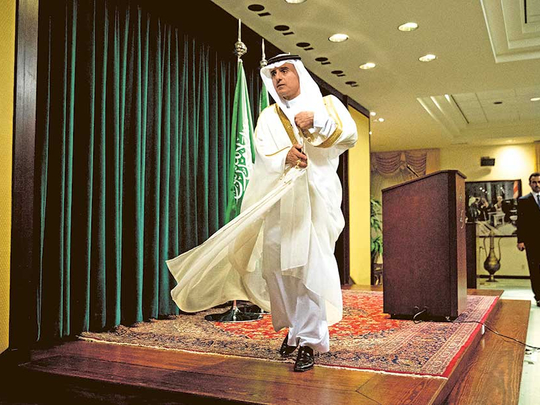
Washington: Saudi Arabia welcomed the release of 28 pages of an investigation into the terrorist attacks of 9/11 on New York and Washington DC as finally removing suspicions of the kingdom’s alleged complicity in the attacks.
Adel Jubeir, the foreign minister of Saudi Arabia, which has urged the release of the chapter since 2002, said the documents should finally put to rest questions about Saudi Arabia’s suspected role in the September 11 attacks.
“That matter is now finished,” he told a news conference in Washington. “The surprise in the 28 pages is that there is no surprise.”
Asked whether the report exonerated the kingdom, he said: “Absolutely.”
|
|
In this September 11, 2001 file photo, American Airlines Flight 175 closes in on World Trade Center Tower 2 in New York, just before the impact. AP |
Saudi Arabia has urged the release of the chapter since 2002 so the kingdom could respond to any allegations and punish any Saudis who may have been involved in the attacks.
“Since 2002, the 9/11 Commission and several government agencies, including the CIA and the FBI, have investigated the contents of the ‘28 Pages’ and have confirmed that neither the Saudi government, nor senior Saudi officials, nor any person acting on behalf of the Saudi government provided any support or encouragement for these attacks,” Abdullah Al Saud, Saudi Arabia’s ambassador to the United States, said in a statement on Friday.
“We hope the release of these pages will clear up, once and for all, any lingering questions or suspicions about Saudi Arabia’s actions, intentions, or long-term friendship with the United States,” he said. “Saudi Arabia is working closely with the United States and other allies to eradicate terrorism and destroy terrorist organisations.”
White House spokesman Josh Earnest told reporters before the pages were released that they would show no evidence of Saudi complicity.
Saudi officials had been hoping that the release of the top secret chapter of an early congressional inquiry into 9/11 will end accusations of Saudi complicity in the attacks — allegations that have never been substantiated. Those who pushed for its release say it’s only the beginning.
Congress on Friday disclosed the last chapter of a 2002 congressional report that has been kept under wraps for more than 13 years, stored in a secure room in the basement of the Capitol. Lawmakers and relatives of victims of the attacks who believe that Saudi links to the attackers were not thoroughly investigated had campaigned for years to get the pages released.
The document names individuals who knew the hijackers after they arrived in the United States and helped them get apartments, open bank accounts and connect with local mosques. Fifteen of the 19 hijackers were Saudi nationals and several had little experience living in the West.
Several investigations into the attacks followed the congressional inquiry. The most well-known investigation was by the 9/11 Commission, which in 2004 stated that it found “no evidence that the Saudi government as an institution or senior Saudi officials individually funded” Al Qaida. “This conclusion does not exclude the likelihood that charities with significant Saudi government sponsorship diverted funds to Al Qaida.”
Republican Senator Richard Burr, North Carolina, chairman of the Senate intelligence committee, and vice-chairman Democrat Dianne Feinstein, California, urged the public to read the results of the subsequent investigations by the CIA and FBI that they say “debunk” many of the allegations in the congressional inquiry, and put conspiracy theories to rest.
But former Florida Senator Bob Graham, the co-chairman of the congressional inquiry who pushed hard to get the pages released, remains convinced that the hijackers had an extensive Saudi support system with links to government officials while they were in the United States.
“The information in the 28 pages reinforces the belief that the 19 hijackers — most of whom spoke little English, had limited education and had never before visited the United States — did not act alone in perpetrating the sophisticated 9/11 plot,” Graham said.
“I’m a little flabbergasted that some of the people who contributed to the 13 years that this was withheld are now saying it is not important,” he said, without mentioning any names. “If so, why did they keep it from the public for so many years?”
Graham also said he hoped the release would pave the way for more documents to be disclosed.
“This is not the end,” he said. “Most of what we know about 9/11 is from the investigations that were done in southern California and that’s the primarily focus of the 28 pages. Ironically, two-thirds of the hijackers lived, most of the time they were in the US, in Florida and we know very little about their financing, who they associated with, or what assistance they may have received.”
Graham said a federal judge in Florida is combing through 80,000 pages that include reports from the FBI’s investigation into the hijackers’ activities in Sarasota, Florida, to see if they should be released in a Freedom of Information Act suit brought by the corporate parent of Florida Bulldog, an investigative reporting organisation.
Terry Strada, national chairwoman for 9/11 Families United For Justice Against Terrorism, also said she hoped Friday’s release would help get other material disclosed.
“There is so much more on the Saudi connection to 9/11 and this is the tip of the iceberg, but you had to get this first,” said Strada whose husband, Tom, died in the north tower of the World Trade Center on 9/11. “It’s the beginning, but I don’t think it’s the end.”
The document mentions scores of names that the congressional inquiry believed deserved more investigation.









